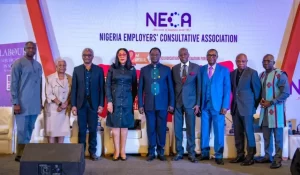Table of Contents
The Nigeria Employers’ Consultative Association (NECA), representing employers in the private sector, has voiced concerns over the potential negative impact of the newly introduced expatriate employment levy on the ongoing fiscal reforms of President Bola Tinubu’s administration.


In an open letter addressed to the Minister of Interior, Olubunmi Tunji-Ojo, NECA detailed its apprehensions, emphasizing that expatriates working in Nigeria already face increasing levies.

Join our Telegram Channel for Updates
The letter highlighted the financial burdens imposed on expatriates, such as processing costs ranging from $1,000 to $2,000 for the Combined Expatriate Residence Permit and Alien Card (CERPAC), along with administration fees ranging from $50 to $200.
NECA argued that the newly introduced expatriate employment levy could counteract efforts to attract foreign direct investment, hinder businesses in need of expertise, and weaken the ongoing fiscal reforms led by the Presidential Fiscal Policy and Tax Reform Committee.
The association expressed concern about the consistent introduction of policies, almost every week, which they believe have the potential for adverse effects on the Nigerian economy.
In a bid to generate revenue and promote job creation for Nigerians in foreign-operated firms, President Bola Tinubu inaugurated the expatriate employment levy.
The initiative also aims to address the pay disparity between expatriates and local employees. The implementation of the expatriate employment levy will involve a Public-Private Partnership (PPP) model, with the Nigeria Immigration Service (NIS) serving as the primary executing agency.









